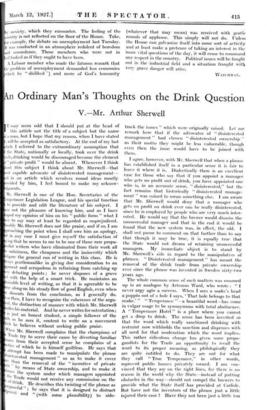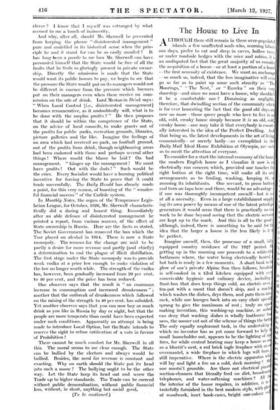n Ordinary Man's Thoughts on the Drink Question
V.—Mr. Arthur Sherwell
T may seem odd that I should put at the head of this article not the title of a subject but the name [a man, but I hope that my reason, when I have stated , will be accepted as satisfactory. At the end of my last rticle. I referred to the extraordinary assumption that I he State, nationally or locally, took over the drink -ale, drinking would be discouraged because the element f" private profit" would be absent. Whenever I think bout this subject I think about Mr. Sherwell—that lost capable advocate of disinterested management— Id in an article which revolves round ideas mostly rovided by him, I feel bound to make my acknow- Igments.
Mr. Sherwell is one of the Hon. Secretaries of the emperance Legislation League, and his special function to provide and edit the literature of his subject. I ive not the pleasure of knowing him, and as I have limed my opinion of him on his " public form " what I ye to say may at least be regarded as unprejudiced. ssibly Mr. Sherwell does not like praise, and if so, I am ,proaching the point when I shall owe him an apology, it in any case I must give myself the satisfaction of ying that he seems to rue to be one of- those rare propa- talist writers who have eliminated from their work all e unfairness, the cheapness and the insincerity which sfigurc the general run of writing in this class. He is Ways gentlemanlike in giving due consideration to an ponent and scrupulous in refraining from catching up ere debating points ; he never disposes of a grave et with the help of a smart trick. He maintains an mirable level of writing, so that it is agreeable to be me along on his steady flow of good English, even when e dissents from the conclusion, as I generally do. 'en then, I have to recognize the coherence of the argu- lit, the distinction of manner with which Mr. Sherwell idles his Material. *And he never writes for ostentation; IS just an honest student, a simple follower of the MI as he sees it, 'content to write on a movement 'kb he believes without seeking public praise. Mien Mr. Sherwell complains that the champions of e Trade try to serve their cause by diverting familiar !rases from their accepted Sense he complains of a a'tice of which he is himself guiltless. He says that atteinpt has been made to manipulate the phrase disinterested management ". so as to make it - cover ft than the removal of the "incentive of private :t by means of 'state ownership, and to make it ee the system under which managers appointed tile Trade would not -receive any commission on the e of drink. He describes this twisting of the phrase as urposeful " ; he _says that it is designed to distract groent and "(with some plausibility) to side- track the issues " which were originally raised. Let Inc remark here that if the advocates of "disinterested management " had chosen " disinterested ownership " as their motto they might be less vulnerable, though even then the issue would have to be joined with them.
I agree, however, with Mr. Sherwell that when a phrase has established itself in a particular sense it is fair to leave it where it is. Dialectically there is an excellent ease for those who say that if you appoint a manager who gets no profit out of drink, you have appointed one who is, in an accurate sense, " disinterested," but the fact remains that historically " disinterested manage- ment " was coined to mean something else. I am aware that Mr. Sherwell would deny that a manager who gets no profit on drink ever can be really disinterested, since he is employed by people who are very much inter- ested. He would say that the brewer would dismiss the unsuccessful manager and that in the end it would be found that the new system was, in effect, the old. I shall not, pause to comment on that further than to say that though it may be true, it is equally true that the State would not dream of retaining unsuccessful managers. My immediate object is to stand by Mr. Sherwell's side in regard to the manipulation of phrases. "Disinterested management " has meant the removal of the drink trade from private ownership ever since the phrase was invented in Sweden sixty-two years ago.
The whole common sense of such matters was summed up in an analogue by Artemus Ward, who wrote : "I never argy agin .a success. When I sees a snake's head poppin out of a hole I says, 'That hole belongs to that snake.'" "Temperance 7-7a beautiful word—has come in vulgar usage to be synonymous with total abstinence. A "Temperance Hotel" is a place where you cannot get a drop to drink. The sense has been inverted so that the word which really sanctioned drinking with restraint now withholds the sanction and dispenses with all need for that moderation which the word implies. This rather ridiculous change has given sonic propa- gandists for the Trade an opportunity to recall the word to its proper meaning, as philologically they are quite entitled to do. They arc out for what they call "True Temperance," in other words, mproved.- public houses privately owned. I am con- vinced that they are on the right lines, for there_ is no reason in the, world why the State—instead of putting obstacles- in the way—should not compel the -brewers to provide what the State itself has provided at Carlisle. But have not the inventors of the phrase just a little injured their case ? Have they not been just a little too clever ? I know that I myself was estranged by what seemed to me a- touch of insincerity.
And why, after all, should Mr. Sherwell be prevented from keeping the phrase " disinterested management" pure and undefiled in its historical sense when the prin- ciple he and it stand for can be so easily assailed ? It has long been a puzzle to me how Mr. Sherwell can have persuaded himself that the State would be free of all the faults that he finds so glaringly present in private owner- ship. Directly the admission is made that the State would want its public houses to pay, we begin to see that the pressure the State would put on its managers would not be different in essence from the pressure which brewers put On their managers even when these receive no com- mission on the -sale of drink. Lord Meston in Drink says : "When Local Control [i.e., disinterested management] becomes remunerative, as it undoubtedly will, what is to be done with the surplus profits ? " He then proposes that it should be within the competence of the State, on the advice of local councils, to make grants out of the profits for public parks, recreation grounds, libraries, picture galleries and the like. Imagine the feelings of an area which had received no park, no football ground, out of the profits from drink, though neighbouring areas had been endowed with those and perhaps several' other things ! Where would the blame be laid ? On bad management. "Ginger up the management ! We must have profits ! Out with the duds ! " Such would be the cries. Every Socialist would have a burning political incentive for forcing the State to prove that it 'could trade successfully. The Daily Herald has already made a point, for this very reason, of boasting of the " wonder- ful financial success" of the Carlisle system.
In Monthly Notes, the organ of the Temperance Legis- lation League, for October, 1926, Mr. Sherwell characteris- tically did a daring and honest thing. Immediately after an able defence of disinterested management he printed a report, from various sources, of the effect of State ownership in Russia. Here are the facts as stated. The Soviet Government has removed the ban which the Tsar placed on alcohol in 1914. There is now a State monopoly. The reasons for the change are said to be partly a desire for more revenue and partly (and chiefly) a determination to end the plague of illicit distillation. The first stage under the State monopoly was to provide weak vodka at a price low enough to make violation of the law no longer worth while. The strength of the vodka has, however, been gradually increased from 20 per cent. to 40 per cent, and the price has been reduced.
One observer says that the result is "an enormous increase in consumption and increased drunkenness " ; another that the outbreak of drunkenness which followed on the raising of the strength to 40 per cent. has subsided. Yet another observer says that you can now buy as much drink as you like in Russia by day or night, but that the people are more temperate than could have been expected under such conditions. Apparently an attempt is being made to introduce Local Option, but the State intends to reserve the right to refuse ratification of a vote in favour 'of Prohibition !
There Cannot be much comfort for Mr. Sherwell in all this. The moral seems to me clear enough. The State can be bullied by the electors and always would be 'bullied. Besides, the need for revenue is constant and -exacting. Why on earth should the State put its head into such a noose ? The bullying ought to be the other way. Let the State keep its head out and screw the Trade up to higher standards. The Trade can be coerced without public demoralization, without public financial loss, without; short, anything but social good.
• (To be continued.)































































 Previous page
Previous page